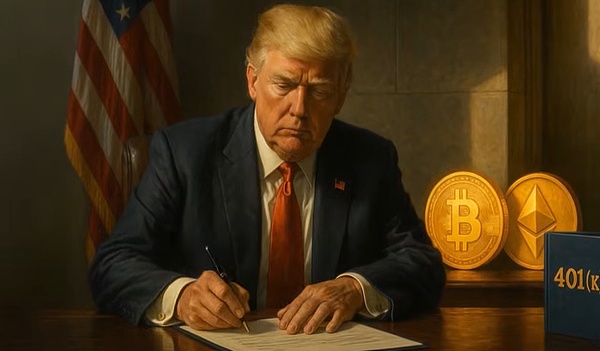
President Donald Trump will sign an executive order today,Instructing federal regulators to simplify the legal path to the 401(k) program to incorporate private equity, real estate, cryptocurrencies and other alternative assets.
According to Bloomberg, the directive requires the Ministry of Labor to re-evaluate the Trustee Guidance under the Employee Retirement Income Security Act (ERISA) framework and coordinate with the SEC and the Ministry of Finance to provide a wider investment channel for fixed contribution plans.
The move regards approximately $12.5 trillion in U.S. retirement savings funds as a potential funding channel for asset management companies that have been restricted from entering the retail distribution pool for a long time.While the traditional 401(k) program remains focused on publicly traded stocks and bonds, the government’s directive will be the most groundbreaking policy shift to date, bringing alternative assets, including digital currencies, into mainstream retirement products.
The directive is a continuation of a series of measures since early 2025 that have gradually removed previous regulatory barriers.In May, the Labor Department revoked a 2022 compliance announcement that warned trustees not to provide cryptocurrency in retirement products without strict scrutiny.
Previous guidance deviates from ERISA’s principle-based regulatory approach and adopts stricter standards for digital assets.With the revocation of this opinion, the trustee will need to once again evaluate all assets, including cryptocurrencies, based on a unified standard of prudence rather than a special principle of prudence.
In March this year, Trump signed an executive order to establish a strategic Bitcoin reserve and a separate national digital asset reserve pool.The White House then held a Crypto Week event and finally signed the GENIUS Act, the first federal legislation to regulate stablecoins in the United States.The government has also appointed venture capitalist David Sacks as head of cryptocurrency and AI affairs to further deepen the policy direction of promoting financial innovation through digital assets.

What does it mean to allow cryptocurrencies to enter a 401(k) retirement plan
Opening the 401(k) program to digital assets and private markets not only marks a shift in market access, but also reflects a broader restructuring of ideas.As the number of listed companies dropped to nearly half of its peak in 1996, private equity, venture capital and digital assets have grown into core elements of capital formation.
Institutional investors such as endowments and pension funds have increased their exposure to these instruments, while retail savers are still limited to more limited investment vehicles.Faced with the allocation cap of institutional clients, asset managers regard the fixed contribution plan as the next frontier area.
This latest directive echoes Trump’s first term move, when the Labor Department allowed retirement plan administrators to include private equity in diversified investment options without violating trustee duties.
The guidance was revoked during the Biden administration and has now been restored through this new move.Previous legal concerns and fear of trustee liability have prevented the plan sponsor from providing illiquidity or complex products, but current policies aim to form a formal framework to reduce perceived compliance risks, Bloomberg reported.
For cryptocurrencies, especially, the directive laid the foundation for their formal inclusion in portfolios, which, until recently, have been unable to enter the portfolio due to regulatory opposition.
Trustee still needs to demonstrate compliance with ERISA’s prudential principles and obligation of care standards, but is no longer subject to specific asset classes.The impact includes retail savers may be exposed to investment tools with high volatility and high expenses, so information disclosure, valuation methods and custody guarantees need to be reemphasized.
The Labor Department said it will coordinate with the SEC and other agencies to evaluate further rulemaking.The SEC is expected to take steps to provide access to cryptocurrencies and private market assets for participant-led programs.
At the same time, companies such as Blackstone, Apollo, and KKR that have long advocated 401(k) funds to enter the private market are expected to benefit from the first-mover infrastructure and lobbying investment.
Critics argue that complex assets may increase the risk of savers who lack financial knowledge, especially in the absence of strong regulation or transparent rate disclosure.But supporters believe that the planned products should be decided by the trustee rather than excluded, and savers should have access to a full range of modern capital instruments.
The effectiveness of the executive order will depend on the upcoming implementation steps of federal agencies.Currently, it establishes a policy marker that repositions the retirement system as a broader exposure to private and digital asset classes, marking another step in the government’s integration of cryptocurrencies into the country’s economic infrastructure.






